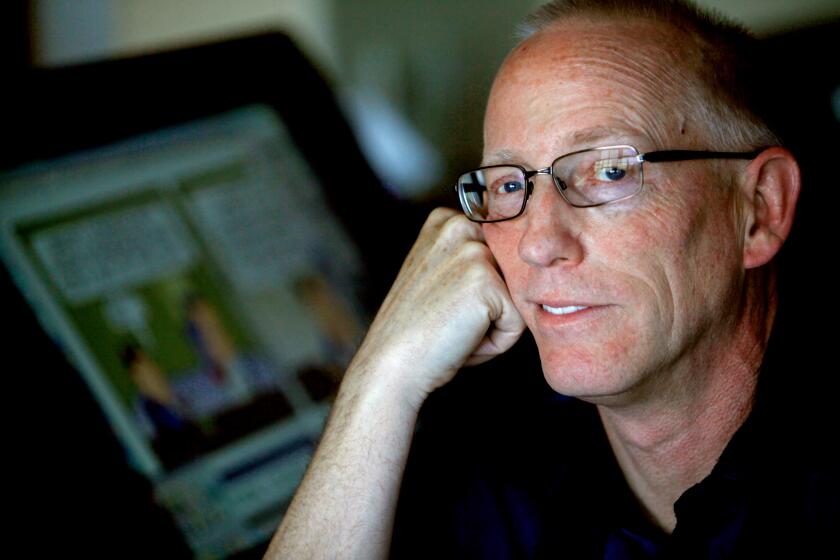‘Incendies’ director Denis Villeneuve talks about his journey
- Share via
Canadian filmmaker Denis Villeneuve had two movies under his belt when he saw Wajdi Mouawad’s acclaimed play “Incendies” in May 2004 in Montreal. Though he was writing another movie at the time, Villeneuve tracked down Mouawad to see if he could obtain the film rights. Mouawad said yes — on one condition. Villeneuve had to show he could make the movie his own.
To convince him he could take the material beyond the stage, Villeneuve, his head already bursting with images, sat down and wrote what turned out to be the movie’s powerful opening scene.
It’s a wordless tracking shot, nearly five minutes in length, that establishes the film’s unnamed Middle East setting before slowly panning indoors to show a room full of young boys having their heads shaved and being armed with weapons. The camera zeroes in on one boy, three small scars on his heel, the anger and hatred burning in his eyes. All the while, Radiohead’s hypnotic song, “You and Whose Army,” builds to a crescendo in the background.
That scene sold the playwright, and Villeneuve went on to fashion a highly cinematic film out of Mouawad’s politics-is-personal dialogue-heavy material. “Incendies,” which opens Friday in Los Angeles, won over audiences at the Telluride and Toronto film festivals last year before landing an Oscar nomination for foreign language film. It recently won eight Genie Awards, including picture, director and screenplay, in Villeneuve’s home country.
Moving between the past and present, “Incendies” tells the story of two Middle-Eastern-born twins in Quebec who, after their indomitable mother’s death, must travel back to her war-torn homeland to untangle her tragic past. The play feels like a Greek tragedy. The movie is a visceral heart-wrencher about the damages inflicted by cyclical anger and the necessity of breaking that cycle, no matter the cost.
“Denis decided to destroy the play in order to rebuilt it,” says Lubna Azabal, who plays the mother at various ages in the film. “You could do a thousand movies from this. He chose one angle, the women’s point of view.”
That choice wasn’t entirely surprising. Villeneuve’s four feature films have had strong female protagonists, and the last two — “Incendies” and 2009’s “Polytechnique” — looked at women dealing with violence and power in the modern world.
Over a cup of tea during a recent visit to Los Angeles, the affable Villeneuve calls the female-driven focus of his films a coincidence. Says “Incendies” producer and longtime friend Luc Dery: “Denis loves women and women love Denis as well, but I don’t think this is something he consciously planned. He’s just a sensitive guy.”
“Maybe it’s this,” Villeneuve, 43, offers. “I grew up in a very small village, Gentilly, where there were two prominent figures — both of them my grandmothers. They were very powerful women, and they were enemies.” Villeneuve laughs. “My parents’ getting together? Long story. Very ‘Romeo and Juliet.’”
Villeneuve made “Incendies” and “Polytechnique” back to back after a long break during which he stopped making movies, spent time with his wife and three children and reinvented himself as a filmmaker. This involved a lot of reading, thinking and therapy.
“I stopped because I realized I had a big problem with screenwriting.... I was not good,” Villeneuve says, laughing. “I was not able to express an idea the right way with an image. And I was afraid of actors. I didn’t understand that kind of animal.
“It was a huge process,” Villeneuve continues. “With filmmaking, your worst enemy is yourself. So you have to understand yourself and you have to make a long introspection trip. And it was the best trip I ever made.”
Villeneuve generously credits playwright Mouawad for the critical and commercial success of “Incendies.” But it’s clear from the film’s many striking, wordless sequences that the time away gave Villeneuve the confidence to pare down language and give images a primacy, not to mention the assurance to shoot and edit that opening scene to the Radiohead song without having any guarantee that the band would approve its usage in the movie.
“When it comes to artistic moves, I always jump. I don’t think,” Villeneuve says, adding that band members gave him the song after seeing a rough cut of the movie. “I told myself that even if it’s just a phantasm, the song will be inside the movie in spirit.”
Villeneuve would like to extend that sense of optimism to the film’s hope that chains of violence and anger can be broken. And not just in the Middle East, which is why neither the film nor the play specify the setting, though the climate in the movie does closely mirror the Lebanese civil war that lasted from 1975 to 1990.
“‘Incendies’ is talking about taking the first step,” Villeneuve says. “It’s not the whole process. There’s so much anger. It’s a huge challenge. But what I love about Wajdi is that there is no cynicism in his ideas and story. I love that. It keeps hope alive, and I think hope is what we need right now.”
?
?
More to Read
The biggest entertainment stories
Get our big stories about Hollywood, film, television, music, arts, culture and more right in your inbox as soon as they publish.
You may occasionally receive promotional content from the Los Angeles Times.











